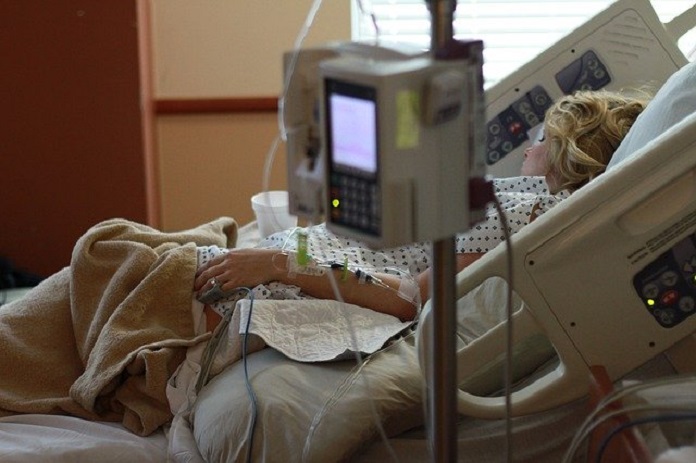Caesarian section births with general anesthesia have a 54% greater risk of postpartum depression when compared to C-sections with spinal anesthesia.
Can decisions taken by doctors and mothers-to-be about the birthing method affect the chances of developing postpartum depression?
While natural birth is still the most common form of delivery for women, the Canadian Institute for Health Information states that around 28% of women will give birth through a caesarian section (C-section). This is a procedure where an incision is made in the lower abdomen of a pregnant woman, opening up the uterus and removing the baby through the abdominal opening rather than through the birth canal.
In fact, C-sections are the most common inpatient surgical procedure in Canada, and their rates continue to increase on a yearly basis. There are many possible reasons why a woman can choose to schedule this procedure, including personal choice, working around doctor schedules, and the position of the baby as the due date approaches. However, there are also many situations where a woman who was planning to give birth naturally may have to undergo an emergency C-section. These include risks to the mother’s life, such as excessive bleeding and the inability for the baby to pass through the birth canal, as well as risks to the baby’s life, such as undetected birth defects, and placental and cord issues that prevent the baby from getting enough life-giving oxygen.
Since a C-section is an operation, it comes with certain risks, including blood loss, organ damage, infections, and blood clots. Serious decisions must be made by doctors, including how quickly the C-section must be performed. This may affect the type of anesthesia that doctors can use for the procedure. Typically, women have a choice between two types of anesthesia. They can have an anesthetic injected near their spine, which numbs the body while they stay awake, or they can have general anesthesia where the mother is unconscious for the entire delivery. Often, general anesthesia will be the first choice in emergency situations since it is the fastest way to start the C-section when time is of the essence.
However, little was known as to what the effects would be of using a general anesthetic on the mother. It is believed to be safe enough for the baby’s and the mother’s immediate health, but new research shows that there are risks in using general anesthesia that go beyond those of the surgery itself.
Researchers in New York City wanted to know if there was an increased risk of mental health problems for mothers who underwent general anesthesia C-sections. They looked at hundreds of thousands of cases of C-section delivery in the New York City area between 2006 and 2013. They excluded any mother who had previously undergone C-sections, or if the mothers had been given general anesthesia within a year before or after the birth of their child. Of the over 400 000 C-section cases that were eligible, nearly 35 000 of those women had undergone general anesthesia.
The researchers then compared the two groups of women who had or hadn’t undergone general anesthesia and checked for signs of postpartum depression. These signs included a diagnosis of
Postpartum depression, suicidal thoughts or self-injury, disorders of anxiety, and post-traumatic stress disorder. What they found was that the women who had undergone general anesthesia for their C-section were at a 54% greater risk of developing symptoms of postpartum depression than the women who had not undergone general anesthesia.
While there is no clear explanation as to why the risks are higher for women who undergo anesthesia for C-sections, this information had never previously been published, and it gives doctors something very important to consider when deciding what type of anesthesia to use for C-section births.
The researchers also recommend including mental health screenings and other follow-up services to help catch cases of postpartum depression, which may result from such procedures in order to improve the mental health of new mothers.
References:
- General anesthesia in cesarean deliveries increases odds of postpartum depression by 54%. (2020). Retrieved 11 February 2020, from https://www.eurekalert.org/pub_releases/2020-02/cums-gai020320.php
- Guglielminotti, J., et al. (2020). Exposure to General Anesthesia for Cesarean Delivery and Odds of Severe Postpartum Depression Requiring Hospitalization. Retrieved 11 February 2020, from https://journals.lww.com/anesthesia-analgesia/Abstract/publishahead/Exposure_to_General_Anesthesia_for_Cesarean.95799.aspx
- C-section rates continue to increase while birth rates decline | CIHI. (2020). Retrieved 11 February 2020, from https://www.cihi.ca/en/c-section-rates-continue-to-increase-while-birth-rates-decline
- Reasons for a C-Section: Medical and Elective. (2020). Retrieved 11 February 2020, from https://www.healthline.com/health/pregnancy/c-section-reasons
- Pregnancy and birth: Cesarean sections: What are the pros and cons of regional and general anesthetics?. (2020). Retrieved 11 February 2020, from https://www.ncbi.nlm.nih.gov/books/NBK279566/
Image by Parentingupstream from Pixabay



